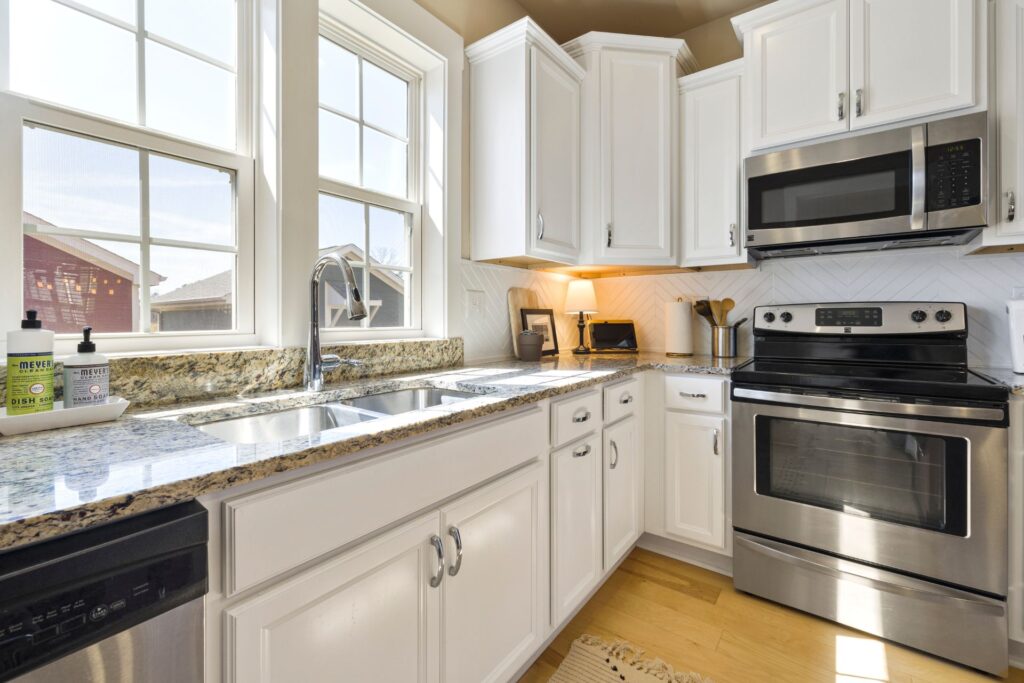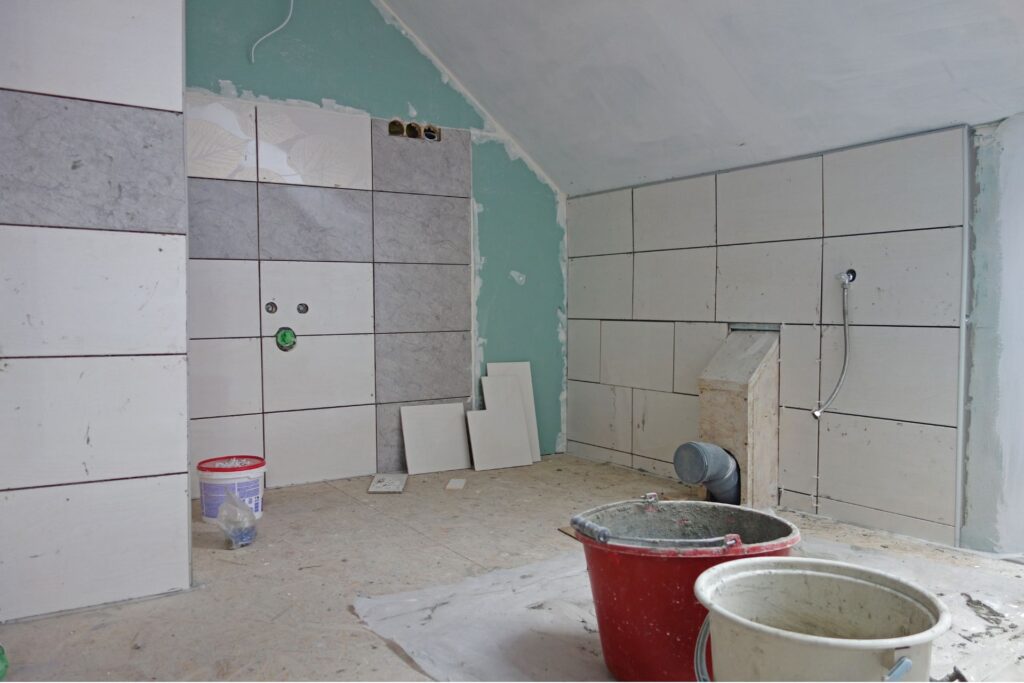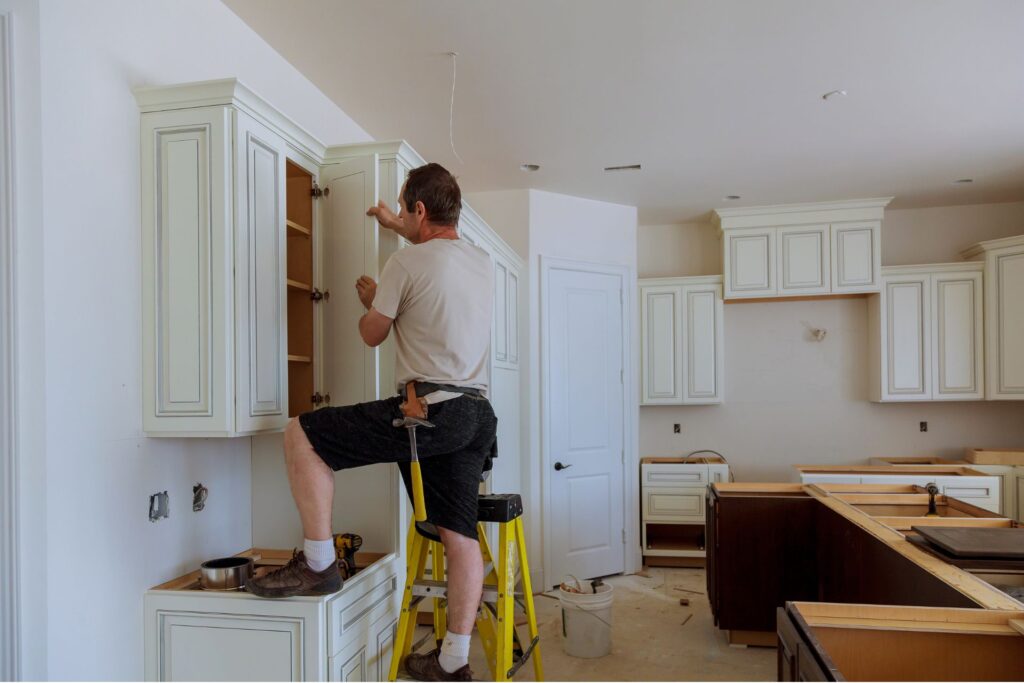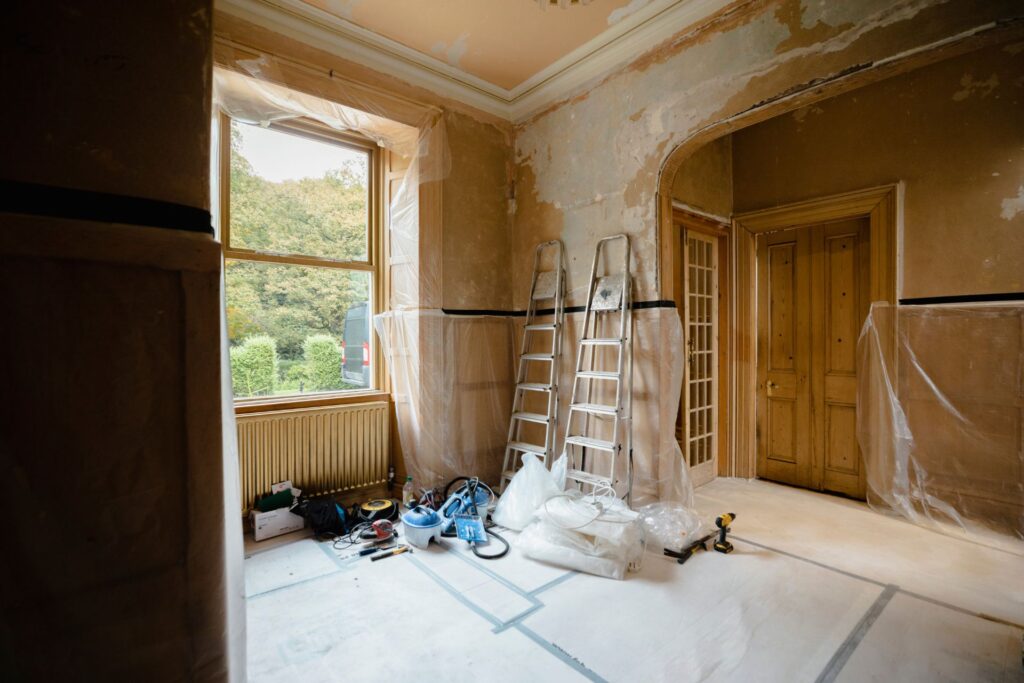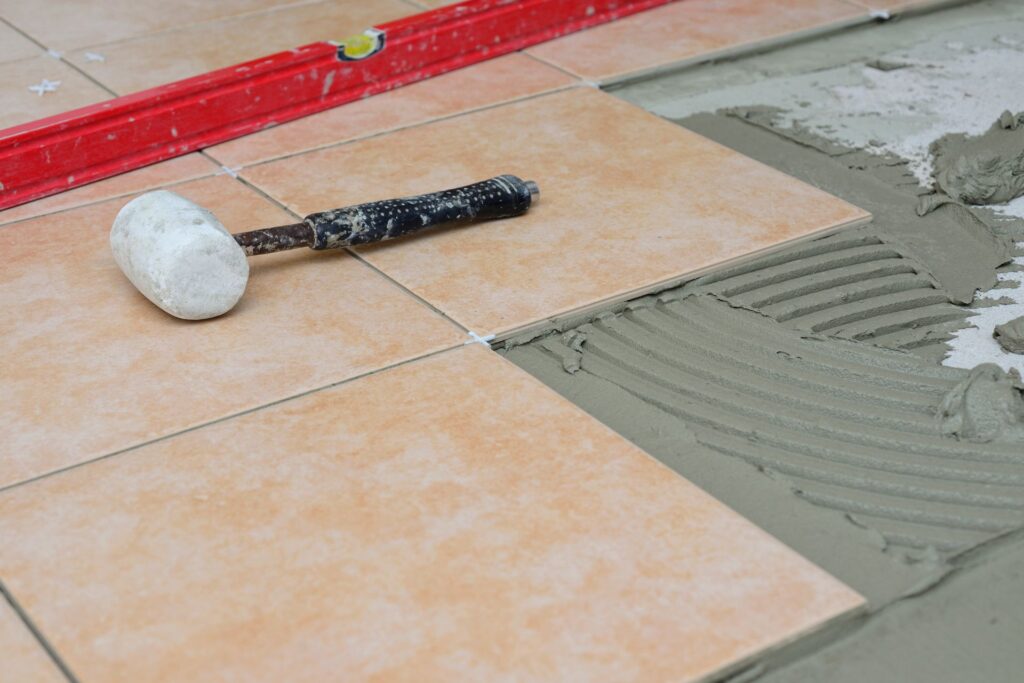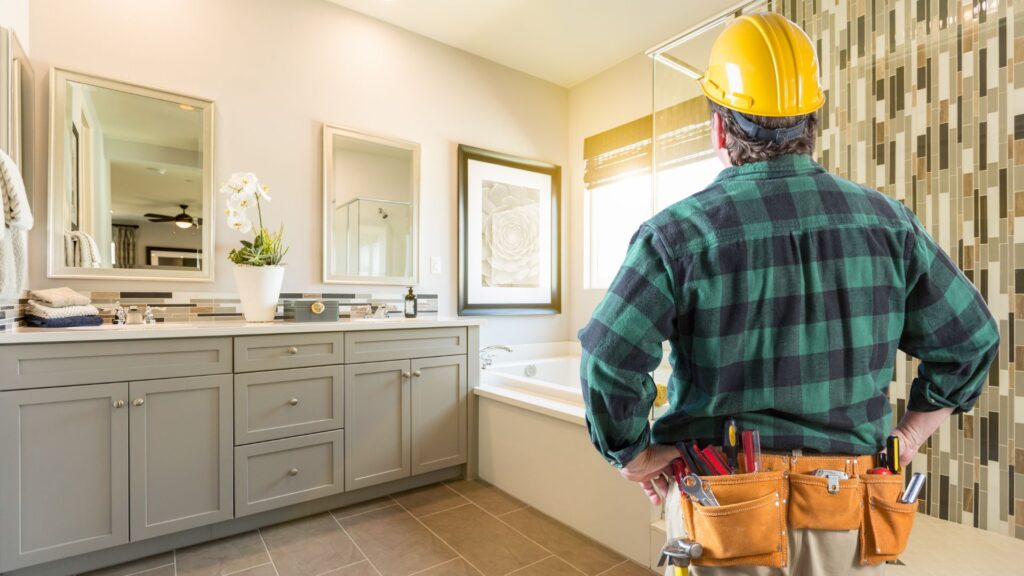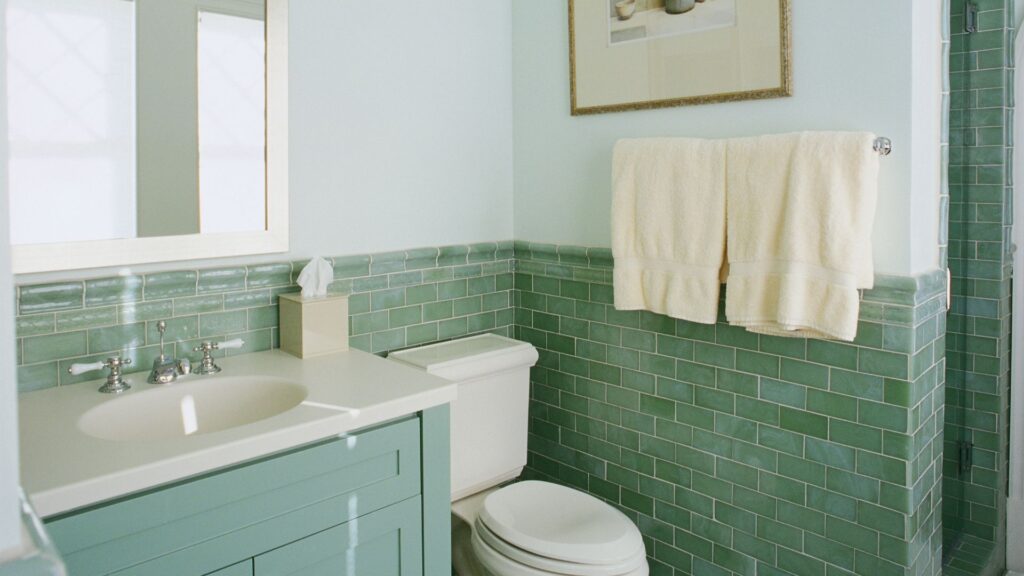Welcome to the world of high-end kitchen renovations, where the possibilities to enhance your home and boost its value are almost limitless. As one of the most frequented and cherished spaces in any household, the kitchen is often a top candidate for an upgrade. In this guide, we’ll dive deep into what makes a kitchen renovation truly “high-end,” including the selection of luxury materials, advanced appliances, and custom designs tailored to your specific needs and tastes. Understanding the factors that influence the overall cost can help you manage your expectations and effectively plan your budget. Whether you’re dreaming of a modern culinary masterpiece or a cozy, top-of-the-line cookspace, we’re here to walk you through every consideration—big and small—to ensure your renovation journey is as smooth and successful as possible.
On average, a high-end kitchen renovation typically costs between $50,000 and $150,000. This price range can vary significantly based on factors such as the quality of materials, the sophistication of appliances, and the scope of custom designs involved. Key considerations affecting the cost include the kitchen’s size, location, and the contractor’s expertise. High-quality materials like marble countertops and custom cabinetry, along with top-tier appliances, are major investments that not only enhance the kitchen’s functionality but also significantly increase its resale value.
- What Defines A High-End Kitchen Renovation?
- Breaking Down The Costs
- Key Factors That Influence Cost
- How To Budget For Your High-End Kitchen Renovation
- Return On Investment (ROI)
- Case Studies And Examples
- FAQs: About Ultimate Guide To High End Kitchen Renovation Cost
- What makes a kitchen renovation 'high-end'?
- How much should I budget for a high-end kitchen renovation?
- What are the biggest cost drivers in a high-end kitchen renovation?
- Can I renovate my kitchen in phases to spread out costs?
- What should I look for in a contractor for a high-end renovation?
- How does the size of the kitchen impact the renovation cost?
- Does a high-end kitchen renovation increase home value?
- What are some unexpected costs I might encounter during a renovation?
- How long does a high-end kitchen renovation typically take?
- Are there sustainable options for high-end kitchen renovations?
- Conclusion
What Defines A High-End Kitchen Renovation?
When planning a kitchen renovation, aiming for a high-end finish not only enhances your home’s aesthetic but also significantly increases its value. Understanding the elements that contribute to a luxury kitchen renovation can help you make informed choices about design, materials, and technology. Here’s what you need to know:
Luxury Materials
A hallmark of a high-end kitchen renovation is the use of luxury materials. Granite and marble are top choices for countertops, offering unmatched beauty and durability. Each piece of stone is unique, providing a one-of-a-kind look that elevates the style of your kitchen. High-quality woods are also essential; they are typically used in custom cabinetry offering a warm, inviting feel coupled with longevity. Investing in custom cabinets not only ensures that you maximize the space and functionality of your kitchen but also adds a personal touch that stands out in the realm of luxury design.
Advanced Appliances
The appliances you choose are just as important as the materials. High-end kitchens often feature appliances from top-tier brands known for their advanced technology and superior performance. Brands like Sub-Zero, Wolf, and Miele are synonymous with luxury and efficiency. These appliances not only enhance the kitchen’s functionality but also integrate seamlessly into the design, contributing to a sleek, modern aesthetic that is both impressive and practical.
Custom Design and Layout
Opting for a custom design and layout in your kitchen renovation allows for an optimal use of space tailored to your specific needs. This could mean crafting an island that doubles as a dining table, incorporating pull-out pantries, or designing custom storage solutions that perfectly fit your utensils and appliances. Customization often comes with higher cost implications, but the investment is reflected in the unparalleled functionality and uniqueness of the finished space.
Integration of Technology
In today’s digital age, a modern high-end kitchen is often a smart kitchen. This includes the integration of advanced technology systems for lighting, heating, and media. Smart kitchens offer convenience and efficiency, allowing you to control various elements right from your smartphone or through voice commands. This could mean adjusting lighting levels, preheating your oven while you’re still at the grocery store, or playing your favorite music playlist without having to touch a button.
A well-planned high-end kitchen renovation incorporates a blend of luxury materials, state-of-the-art appliances, bespoke design, and cutting-edge technology. Each element is chosen not only for its aesthetic appeal but for its functionality and ability to make life easier and more enjoyable. If you’re considering a renovation, these are the aspects you might want to include to ensure your kitchen is both beautiful and highly practical.

Breaking Down The Costs
When embarking on a renovation or construction project, it’s crucial to have a clear understanding of the associated costs to ensure your budget aligns with your vision. Here’s a breakdown of the key expenses you should consider:
Initial Consultation and Design Fees
Your first step in any project should involve consulting with a reputable designer. This phase sets the tone for your entire project, as the designer helps translate your ideas into a viable blueprint. Typically, design fees vary widely based on the designer’s experience and the project’s complexity. It’s worthwhile to invest in a skilled designer who can not only offer innovative ideas but also foresee potential challenges, ultimately saving you money and time.
Materials
The choice of materials can significantly impact the look and longevity of your project. High-end materials like granite countertops or hardwood flooring are investments that can enhance the value of your property. However, costs can vary dramatically. To secure the best deals, consider purchasing materials in bulk or during sales. Additionally, building relationships with suppliers may give you access to discounts or insider pricing not available to the general public.
Labor
Labor costs often constitute a substantial portion of total project expenses. This includes not only general laborers but also specialized craftsmen whose expertise can be crucial for certain elements of your project. The rates for skilled labor can vary based on their specialty and the region. Keep in mind that skilled craftsmen are worth the extra expense as they ensure high-quality work that can prevent costly mistakes or redo’s.
Appliances and Fixtures
Selecting the right appliances and fixtures can transform the functionality and appearance of your space. High-end options typically offer better durability and advanced features, which can be appealing if you’re aiming for a luxury finish. Prices for these items can range widely, so it’s important to research and compare different brands and retailers. Consider factors like energy efficiency, warranty offers, and after-sales service which can add value beyond the initial purchase price.
Unexpected Costs
No project is without its surprises. Unexpected costs can arise from structural deficiencies discovered during the renovation, outdated wiring, or plumbing that needs to be brought up to code. It’s prudent to allocate an additional 10-20% of your total budget for these unforeseen expenses. This contingency fund will help manage stress and ensure that such surprises don’t derail your project.
By understanding and planning for these costs, you can approach your project with confidence, ensuring that you’re prepared for both the expected and the unexpected. Remember, thorough planning and smart budgeting are key to a successful renovation or construction project.
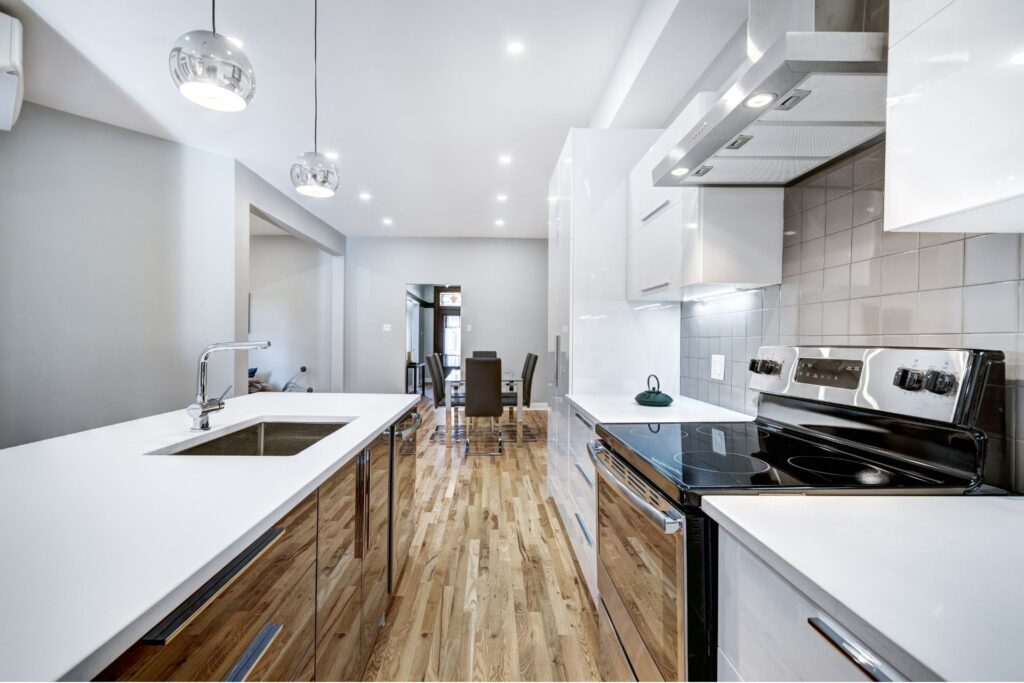
Key Factors That Influence Cost
When planning a kitchen renovation, understanding the key factors that impact cost can help you budget effectively and avoid unexpected expenses. Below, we’ll explore four major elements that significantly influence the total cost of renovating a kitchen. Whether you’re considering a minor update or a complete overhaul, these insights will help you make informed decisions that align with your financial goals.
1. Size of the Kitchen
The size of your kitchen is a primary determinant of renovation costs. Larger kitchens require more materials and labor, which can significantly increase the overall expense. For instance, flooring, countertops, and cabinetry are priced by square footage, so more extensive areas lead to higher costs. Understanding how square footage impacts your renovation budget is crucial, especially if you’re considering expanding your kitchen’s footprint.
2. Geographical Location
Your home’s location plays a crucial role in determining the cost of kitchen renovations. Material costs and labor rates vary widely across different regions. For example, renovating a kitchen in a metropolitan area like New York City is typically more expensive than in a rural setting due to higher labor rates and the cost of materials. Additionally, the availability of contractors and materials can also vary, affecting both the cost and the timeline of your project.
3. Choice of Contractor
Selecting the right contractor is not only essential for ensuring quality and timeliness but also significantly affects your budget. A reputable contractor may charge more upfront but can ultimately provide better value through efficient work and high-quality materials that last longer and perform better. Conversely, a less experienced contractor might offer lower bids but could lead to higher overall costs due to potential delays, subpar work, or the need for future repairs. It’s important to evaluate contractors based on their experience, past projects, and customer reviews.
4. Permits and Regulations
Understanding the necessary permits and regulations in your area is crucial as these legal requirements can have a significant impact on your renovation costs. Depending on your location and the scope of your project, you may need to obtain specific permits or adhere to particular building codes, which can add to your expenses. Additionally, failing to comply with local regulations can result in fines or costly changes down the line, emphasizing the importance of factoring these costs into your initial budget.
By taking into account these critical factors—kitchen size, geographical location, choice of contractor, and permits and regulations—you can more accurately estimate the cost of your kitchen renovation. Planning with these elements in mind will help you set a realistic budget and avoid surprises, ensuring a smoother renovation process. Always consider seeking advice from industry professionals who can provide personalized insights based on your specific circumstances and local market conditions.
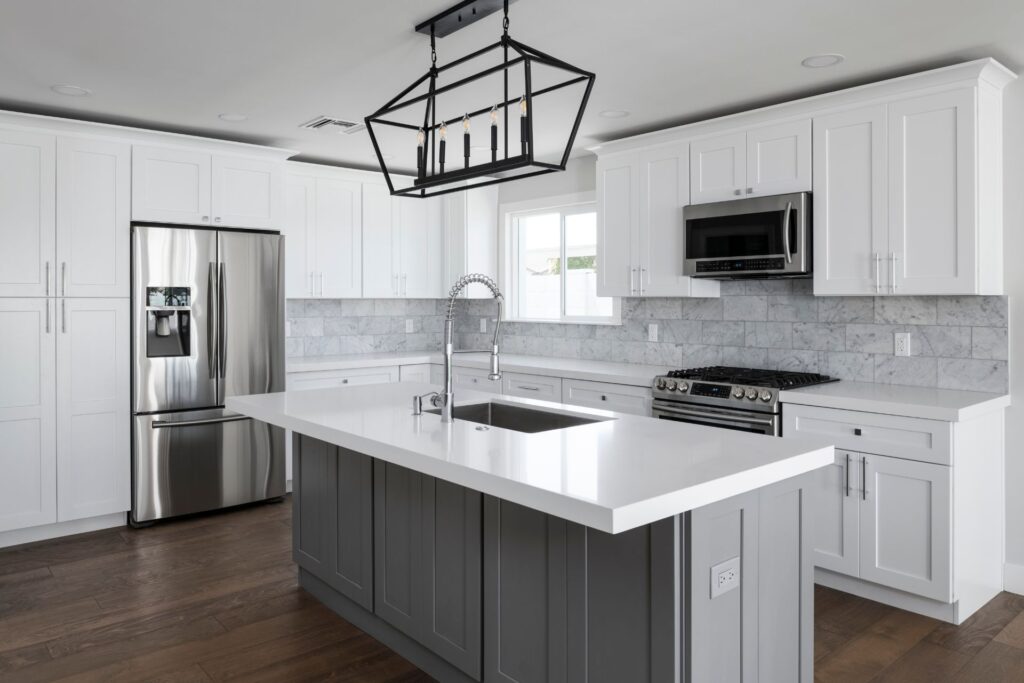
How To Budget For Your High-End Kitchen Renovation
Embarking on a kitchen renovation is not just about achieving the kitchen of your dreams—it’s also about smartly managing your budget to ensure that your vision becomes a reality without financial strain. Here’s a detailed guide on how to effectively budget for a high-end kitchen renovation, ensuring you can enjoy both the process and the final result.
Setting Realistic Goals
The first step in any high-end kitchen renovation is to set realistic goals. Aligning your dream kitchen with your financial situation requires a careful balance. Start by defining what “high-end” means to you—whether it’s luxury appliances, custom cabinets, or top-of-the-line countertops. Once you have a clear picture, itemize these features and estimate the cost of each.
It’s crucial to prioritize what’s most important. Maybe you value a chef-grade stove and oven range more than a built-in espresso machine. Understanding your must-haves versus nice-to-haves will help you allocate your budget more effectively. This not only prevents financial overstretch but also ensures that you invest in aspects of the kitchen that will bring you the most satisfaction.
Obtaining Multiple Quotes
When it comes to renovations, costs can vary widely based on the contractor, materials, and scope of work. That’s why obtaining multiple quotes is essential. It might seem tedious, but comparing bids can save you a substantial amount of money.
Make sure to ask for an itemized bid from each contractor, which should include costs for materials, labor, and any other fees. Also, don’t overlook the importance of checking references and previous work. A lower bid might be appealing, but it won’t be worth it if the quality of work doesn’t meet your expectations. Spending the time to vet your contractors carefully will ensure that you get the best work for your money.
Phasing the Project
A smart strategy to manage cash flow during a high-end kitchen renovation is to phase the project. This means breaking down the renovation into manageable, sequential parts rather than doing everything at once. For instance, you might start with structural changes, followed by electrical updates, and finish with aesthetic touches like cabinetry and paint.
Phasing allows you to spread out the costs over time, which can be less of a financial burden and might also give you room to adjust plans as the project progresses. This approach can be particularly helpful if you’re unsure about committing a large sum upfront or if you want to gauge the project’s direction as it unfolds.
Financing Options
Funding a high-end renovation requires a robust financial strategy. Several financing options are available, each with its own benefits and considerations:
- Home Equity Loans: These are popular for renovations as they typically offer lower interest rates and are secured by your home’s equity. This can be a cost-effective way to borrow but remember, it does put your home at risk if repayments are not managed well.
- Personal Loans: These are unsecured loans based on credit history and income, rather than collateral. They’re quicker to obtain than home equity loans but usually carry higher interest rates.
- Refinancing: Another option is to refinance your mortgage, potentially lowering your interest rate and obtaining extra cash for renovations. This can make sense if you can secure a lower rate than your current mortgage and if you plan to stay in your home long enough to recoup the costs of refinancing.
Each option has its merits and should be considered carefully in the context of your personal financial situation and long-term home ownership plans.
Budgeting for a high-end kitchen renovation is about more than just tallying up costs—it’s about making informed decisions that align with both your financial limits and your lifestyle aspirations. By setting realistic goals, obtaining multiple quotes, phasing the project, and carefully choosing your financing, you can create a stunning kitchen that enhances your home and life, without undue financial stress.
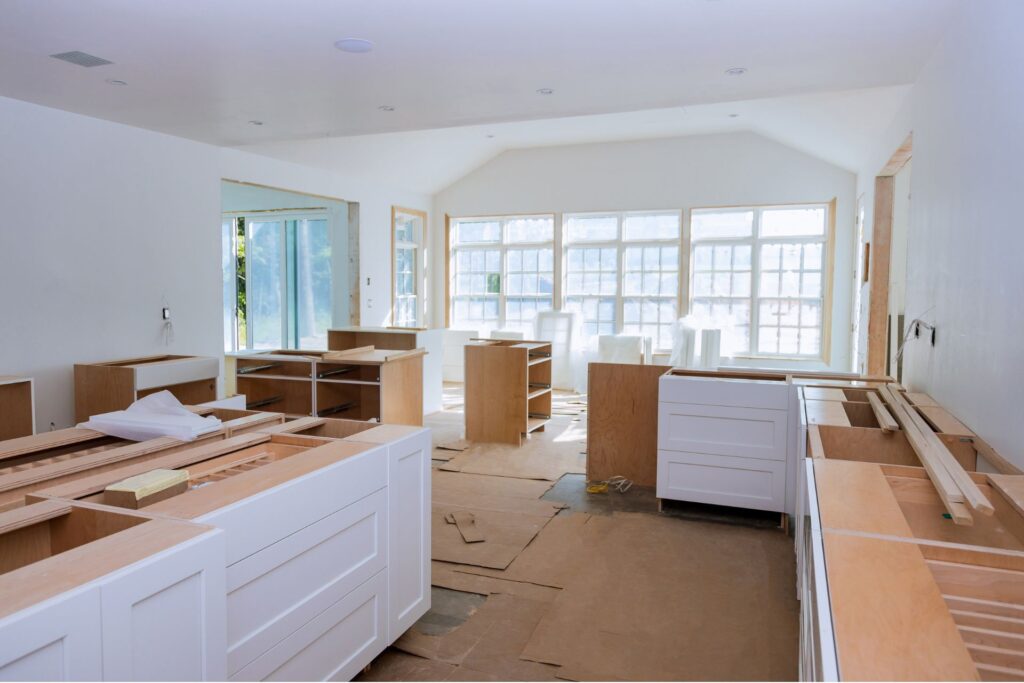
Return On Investment (ROI)
When considering a kitchen renovation, homeowners often weigh the balance between personal taste and the potential increase in their home’s market value. This decision-making process is critical, as it affects both the immediate enjoyment of the living space and its future financial return. In this guide, we’ll delve into how a high-end kitchen remodel can boost your home’s value and how to strike the right balance between creating the kitchen of your dreams and making a sound investment.
Boosting Home Value with a High-End Kitchen Remodel
A modern, well-equipped kitchen is frequently a top priority for prospective homebuyers, making it a strategic area to invest in for anyone looking to increase their property’s market value. Upgrading to high-end finishes, state-of-the-art appliances, and a functional layout can significantly enhance the appeal of your home, thereby increasing its overall value. Studies and real estate professionals suggest that a kitchen remodel can recoup anywhere from 53% to 80% of the investment at resale, depending on the extent of the renovation and the local market conditions.
However, the actual increase in home value can vary widely. Several factors influence these numbers, including:
- The quality of materials: Choosing durable and timeless materials can appeal to a broader range of buyers.
- The overall coherence with the home: The new kitchen should complement the style and quality of the rest of the house.
- Local market trends: In high-demand areas, a kitchen upgrade can significantly tip the scales in your favor.
Balancing Enjoyment vs. ROI
While it’s tempting to design a kitchen that fits your exact specifications and desires, it’s crucial to consider how your choices will resonate with future potential buyers. This doesn’t mean you should compromise on having a kitchen that meets your needs, but rather that a balance should be struck between personalization and universally appealing design choices.
Here are a few tips to maintain this balance:
- Opt for neutral colors: While vibrant colors can reflect personal style, neutral tones are less likely to date and appeal to a wider audience.
- Invest in quality where it counts: High-quality countertops, cabinetry, and hardware are not only durable but also add to the resale value.
- Consider the layout: Ensure the kitchen layout is practical and spacious. An open-plan kitchen, for example, is popular and can improve the flow of your home.
Investing in a kitchen remodel can be a significant financial decision. By focusing on upgrades that enhance both functionality and aesthetic appeal, you can enjoy your new kitchen while also ensuring it serves as a sound investment. Balancing personal taste with market-savvy choices will not only enhance your day-to-day life but also attract future buyers, maximizing your home’s potential resale value.
By keeping these considerations in mind, homeowners can craft a space that truly blends enjoyment with economic sensibility, ensuring a high return on investment when it comes time to sell.
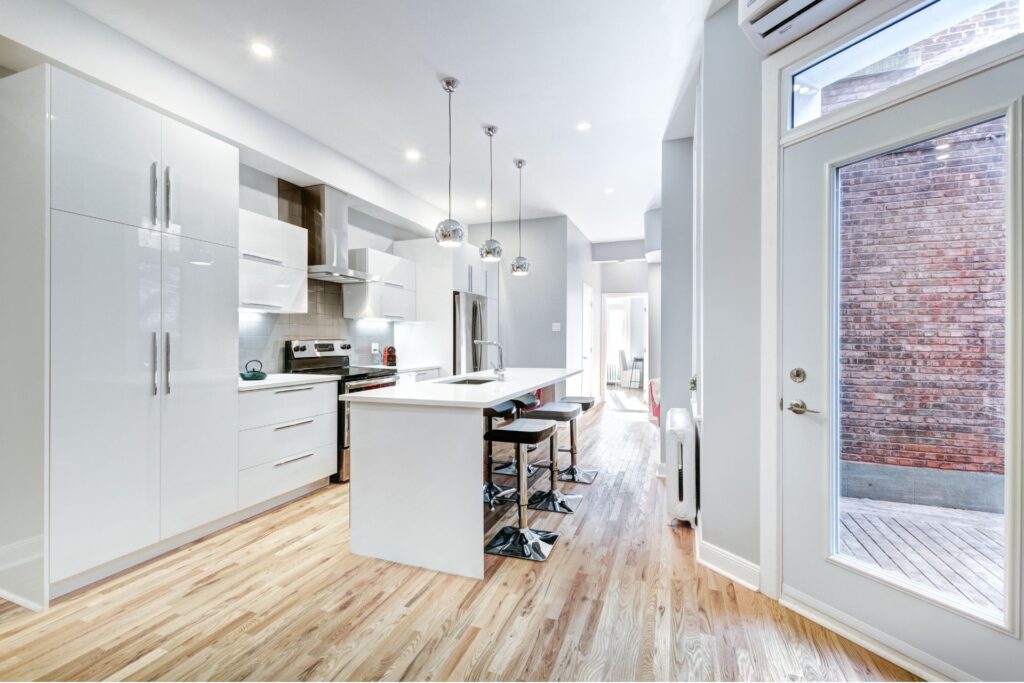
Case Studies And Examples
In the realm of home improvement, real-life examples and expert insights not only inspire but also inform potential homeowners about the possibilities and realities of high-end renovations. Section 6 of our comprehensive guide on luxury home renovations offers an in-depth look at several key features: before-and-after transformations, homeowner interviews, and expert opinions. Here’s what you can expect from this valuable section:
Before and After Transformations
This part of the guide provides a visual and descriptive exploration of high-end renovations. Each example includes high-quality photos showing the state of the space before the makeover and the stunning transformation afterwards. To add more value, each case study breaks down the costs involved and the time taken to complete the project. This detailed view helps homeowners understand budgeting for similar projects and sets realistic expectations regarding timelines.
Interviews with Homeowners
Hearing directly from those who’ve lived through the renovation process is incredibly insightful. This subsection features brief yet informative interviews with homeowners who have invested in luxury renovations. These narratives shed light on the challenges and triumphs of navigating such significant projects. From initial planning to living in a construction zone, and finally, enjoying the revamped space, these interviews offer a personal touch that adds depth to the technical details.
Expert Opinions
No guide would be complete without the input of seasoned professionals. In this section, you’ll find quotes and advice from interior designers and contractors who specialize in high-end renovations. These experts share insights on the latest trends, offer advice on choosing materials, and discuss the importance of sustainable practices in luxury renovations. Their expertise adds an authoritative layer to the guide, providing readers with professional perspectives that are crucial for making informed decisions.
Why This Section Is Crucial
Whether you’re a homeowner contemplating a major renovation or a professional in the real estate or construction industry, this section provides a wealth of knowledge. It not only showcases what’s possible in the world of luxury renovations but also offers practical advice from those who have walked the path before. By combining visual evidence, personal experiences, and expert advice, this guide equips readers with the tools they need to embark on their own high-end renovation projects confidently and knowledgeably.
Through real-world examples and professional insights, Section 6 not only educates but also motivates and inspires. It’s an essential read for anyone looking to understand the complex, rewarding world of luxury home renovations.
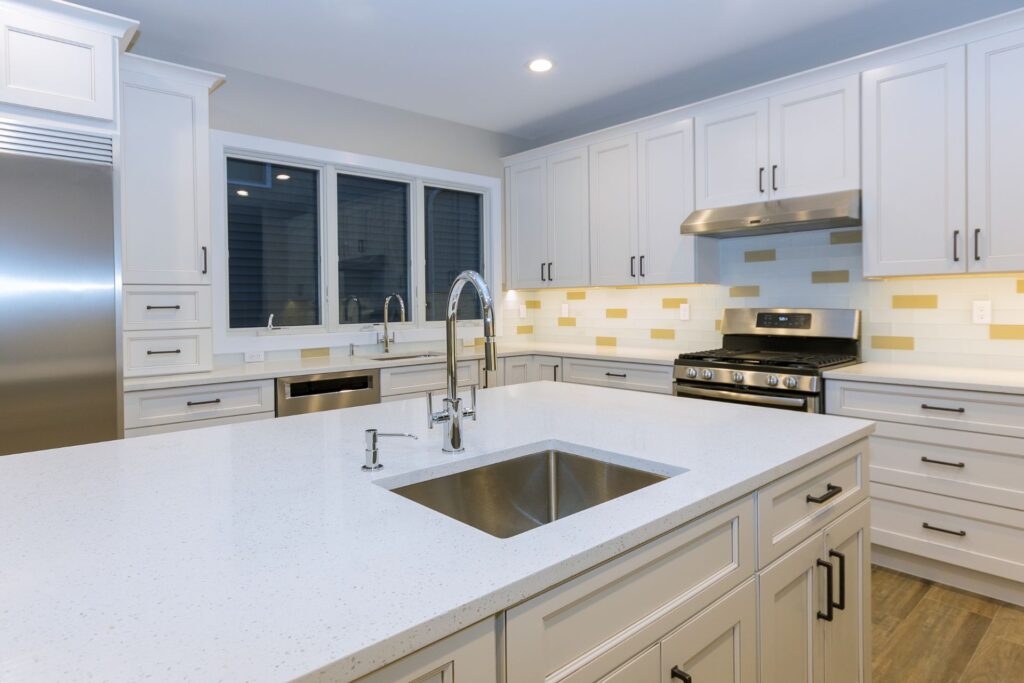
FAQs: About Ultimate Guide To High End Kitchen Renovation Cost
What makes a kitchen renovation ‘high-end’?
High-end kitchen renovations involve the use of premium materials such as marble or quartz countertops, custom cabinetry, and state-of-the-art appliances. These renovations often include a custom layout and design that maximizes the use of space and incorporates the latest technology, such as smart kitchen features.
How much should I budget for a high-end kitchen renovation?
You should expect to budget between $50,000 and $150,000 for a high-end kitchen renovation. This budget will cover costs like materials, labor, design fees, and high-end appliances. The exact amount can vary depending on your specific selections and local market conditions.
What are the biggest cost drivers in a high-end kitchen renovation?
The biggest cost drivers include the quality of materials, the type of appliances, and the complexity of the design. Custom work, such as bespoke cabinetry or specialized stone worktops, typically adds to the total expense.
Can I renovate my kitchen in phases to spread out costs?
Yes, phasing your kitchen renovation is a practical approach to manage spending. You might start with essential updates, such as new appliances or countertops, and gradually move to other areas like flooring or cabinetry.
What should I look for in a contractor for a high-end renovation?
Look for a contractor with experience in high-end renovations and strong references. Ensure they are licensed and insured, and ask for a detailed contract that outlines the scope of work, timelines, and payment terms.
How does the size of the kitchen impact the renovation cost?
Larger kitchens require more materials and potentially more complex layouts, which can increase the overall cost. Conversely, smaller kitchens might cost less but could present design challenges that require creative solutions.
Does a high-end kitchen renovation increase home value?
A high-end kitchen renovation can significantly increase home value, often offering a strong return on investment, especially in markets where luxury kitchens are in demand.
What are some unexpected costs I might encounter during a renovation?
Unexpected costs can arise from structural issues uncovered during the renovation, changes to plumbing or electrical systems to meet code, or design changes initiated during the project.
How long does a high-end kitchen renovation typically take?
A comprehensive high-end kitchen renovation can take anywhere from 3 to 6 months, depending on the complexity and scale of the project. This timeline can extend if there are delays in material supplies or if significant structural changes are required.
Are there sustainable options for high-end kitchen renovations?
Yes, you can choose sustainable materials such as reclaimed wood for cabinetry or eco-friendly countertops. Additionally, energy-efficient appliances can reduce your kitchen’s environmental impact while saving on utility costs.
Conclusion
Concluding our discussion on the intricacies of home renovation costs, it’s crucial to reiterate the importance of a well-informed budget and strategic planning to achieve not only a cost-effective outcome but also long-term satisfaction with your home improvements. Whether you’re updating the kitchen, remodeling the bathroom, or expanding your living space, understanding the financial aspects can guide your decisions and prevent unforeseen expenses. As you move forward, consider how your investment will enhance both the value and the enjoyment of your home. To ensure you’re on the right track, we highly recommend scheduling consultations with local renovation experts or visiting a showroom. These steps will provide you with the practical insights and hands-on experience needed to bring your vision to life effectively and efficiently.
About the Author:
Mike Veail is a recognized digital marketing expert with over 6 years of experience in helping tradespeople and small businesses thrive online. A former quantity surveyor, Mike combines deep industry knowledge with hands-on expertise in SEO and Google Ads. His marketing strategies are tailored to the specific needs of the trades sector, helping businesses increase visibility and generate more leads through proven, ethical methods.
Mike has successfully partnered with numerous companies, establishing a track record of delivering measurable results. His work has been featured across various platforms that showcase his expertise in lead generation and online marketing for the trades sector.
Learn more about Mike's experience and services at https://theleadguy.online or follow him on social media:
